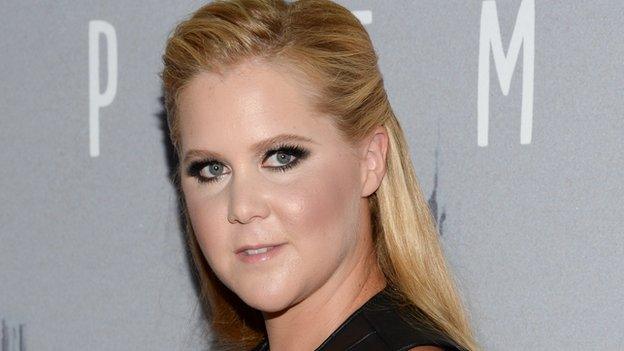Who does Amy Schumer think she is?
- Published
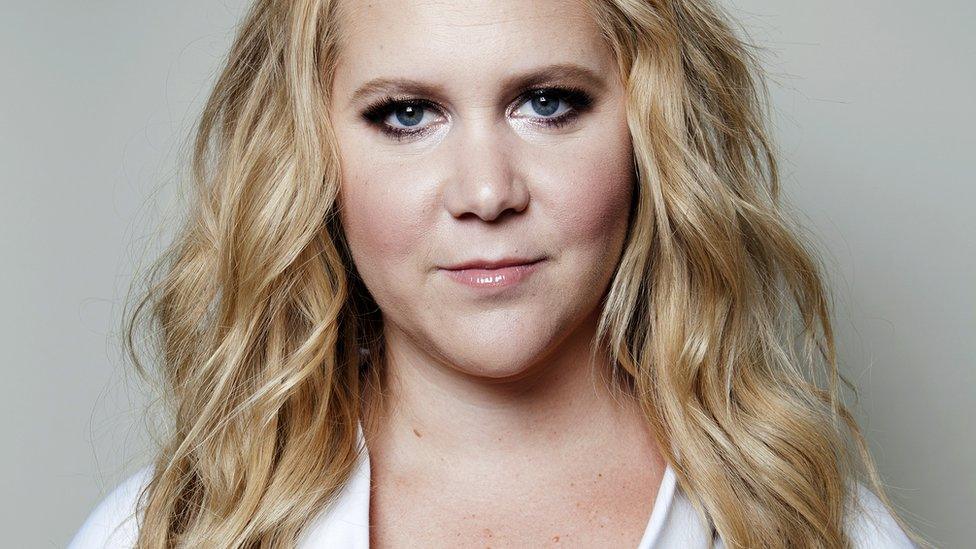
Schumer has her own sketch show on Comedy Central
From diving at the feet of Kanye West and Kim Kardashian and presenting the MTV movie awards; to appearing as Princess Leia on the cover of GQ magazine and urging stricter gun control laws, Amy Schumer is absolutely everywhere.
The hottest name in American comedy, Schumer is nevertheless still something of an unknown quantity in the UK.
That could be about to change with the release of her new movie Trainwreck, which she wrote and Judd Apatow directed.
It's the first time the This is 40 and Knocked Up filmmaker has made a feature film which he has not himself written.
"Judd Apatow reached out to me after hearing me on (US shock jock) Howard Stern a few years ago and he said that he could tell that I could write movies, that I thought visually," she says. "I probably would never have had the confidence to just take it upon myself and write a movie unless he encouraged me.
"Is there a bigger compliment than someone saying I will put my name and a lot of money into you?"
For his part, Apatow has nothing but praise for his leading lady and collaborator: "I heard her on the radio talking about her dad, who has MS and she was telling these really dark stories about what it was like to care for him but they were also really funny and also really warm, you could tell how much she loved her dad.
"I thought she was this really interesting person, she has a side that I haven't seen presented in movies before and I asked her whether she wanted to write a movie."
Before penning Trainwreck, Schumer may have been a newcomer to screenwriting but she had been performing stand up in her native New York clubs since 2004.
Prior to that she graduated from The William Esper studio, an acting school, where she studied for three years.
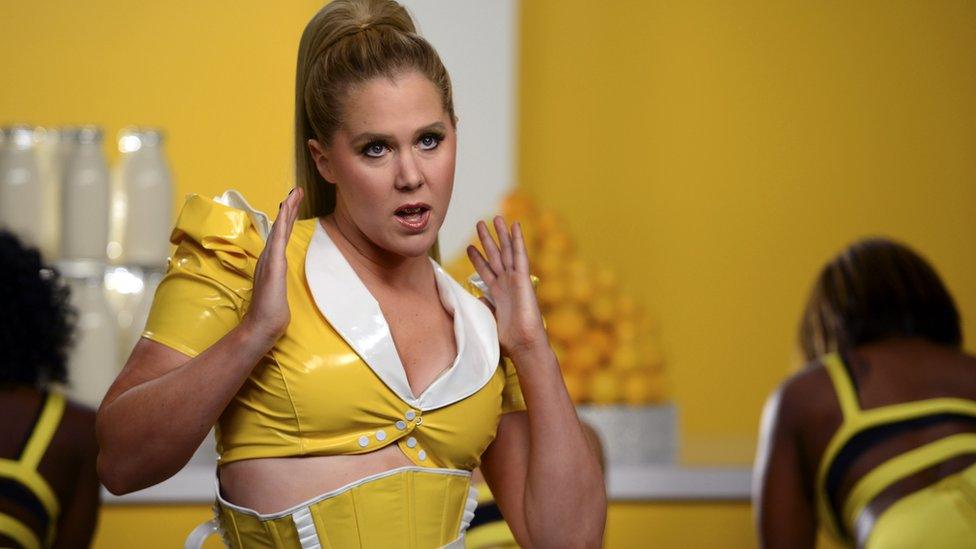
Inside Amy Schumer mixes sketches with stand-up routines
The comic made her network debut in 2007 when she placed third in on NBC's Last Comic Standing and later co-starred on an episode of the hit comedy 30 Rock.
After years of grafting on the sidelines, she says the sudden shift into stardom has been an eye-opener.
"I know that's how things happen and I'm certainly glad that I haven't had this much exposure before. I don't think anyone's ever really ready for this amount of exposure.
"I won a critics' award the other night and I couldn't be there to accept it. So, one of my writers went and said, 'Amy couldn't be here, she's being treated for over-exposure'. I thought that was really funny.
"But it was never my dream; I was never trying to be here. This is so far beyond anything I ever saw for myself that its overwhelming."
In 2013, Comedy Central premiered Inside Amy Schumer, a mix of sketch, stand-up comedy and on-the-street interviews.
With jokes and observations about sex, work, relationships and gender inequality, the series and the two that followed it, introduced Schumer and her take-no-prisoners attitude to a much wider audience.
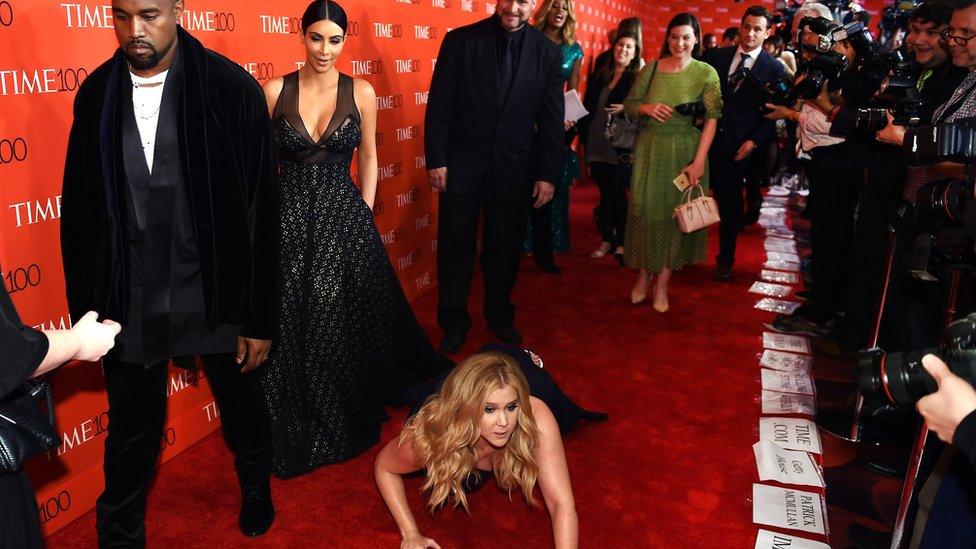
Rapper Kanye West failed to see the funny side when Schumer dived at his feet at an event in New York
Though she has her fans, her jokes about racial stereotypes and race relations have led to some accusations that she has "a blind spot", external on race.
She addressed the criticism, external on Twitter, saying she enjoyed "playing the girl who time to time says the dumbest thing possible, and playing with race is a thing we are not supposed to do, which is what makes it so fun for comics."
Schumer insists she never set out to push the envelope in terms of what she wanted to talk about on stage and in her shows.
"I don't think I ever decided that, it was just what was funny to me. When you start out, you do whatever you can to be on stage so I did a lot of open mics.
"The audience was all comedians and they would sit there with their notebooks and you have to pay to do the show so you have to surprise them or trick them into laughing so that's a skill set I developed early because it was the only way I could get laughs."
In the notoriously male-centric profession of comedy there is little surprise Schumer has faced sexism in all its forms during her time on the road.
"I don't think that I face any more being a comedian," she says. "I think that all women face sexism every day whether it's buying coffee or walking into a grocery store, it's just part of our world. But whenever I'm met with any sexism I call it out."
Sometimes that sexism can come from her frank material.
"The most sexism I've faced is when I get off stage. I talk about sex, right now it makes up about 30% of my act and I'll go on stage after a male comic who maybe talks about sex for 80 percent of his act.
"The booker or promoter will say to me, 'Wow you're not afraid to talk about sex,' but they wouldn't say that to the guy and I would be looked at as easy but the guy wouldn't."
Most recently, Schumer stuck her head above the parapet to address the issue of gun control in the US.
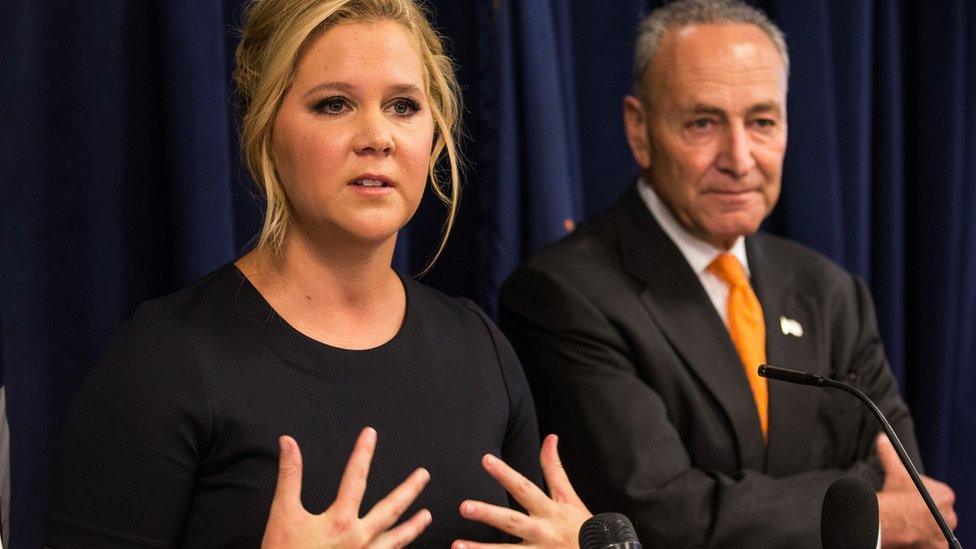
Schumer has called for stricter gun controls following a shooting at a screening of Trainwreck
It followed the fatal shooting of two women at a screening of her film in Louisiana. The gunman had a history of mental health issues.
The comedian put laughs aside to appear with her father's cousin, Senator Chuck Schumer, to call for American state authorities to submit information on potential gun buyers to a national database.
She also criticised proposals to slash funding to mental health services.
The gun issue, in particular, puts her in the sights of the powerful US gun lobby, making it something of a David and Goliath battle.
"I think I did understand the gravity of it," she says. "I have so much room for educating myself about this topic, I think the central issue is money, it's about funding. They're trying to take away money from mental health services, it's awful and I really hope that doesn't happen."
Trainwreck is in UK cinemas now.
- Published4 August 2015
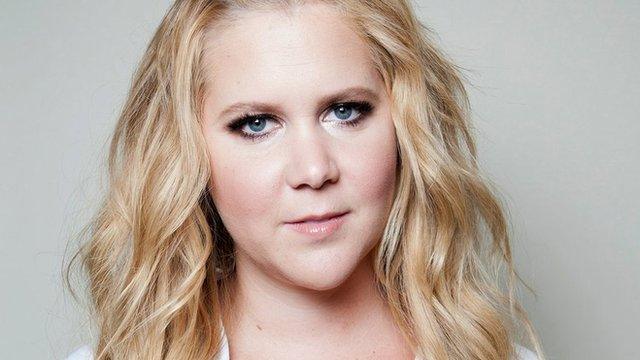
- Published4 August 2015
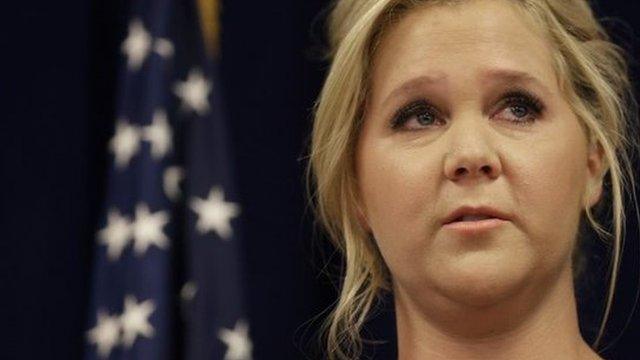
- Published17 July 2015
